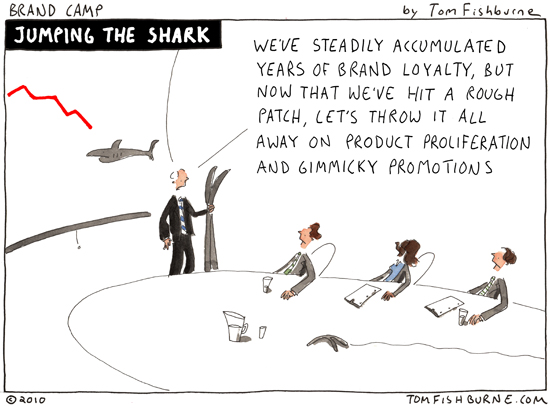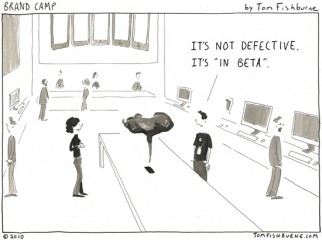My friend Michelle introduced me to the expression, Jumping the Shark, which is used to describe “the moment of downturn for a previously successful enterprise.” It comes from the fifth season of the classic American sitcom, Happy Days, when Fonzie donned swim trunks and his trademark leather jacket to perform a ridiculous water ski jump over a shark.
 The guy who coined the expression describes it as “a defining moment when you know that your favorite television program has reached its peak. That instant that you know from now on…it’s all downhill. Some call it the climax. We call it ‘Jumping the Shark.’ From that moment on, the program will simply never be the same.”
The guy who coined the expression describes it as “a defining moment when you know that your favorite television program has reached its peak. That instant that you know from now on…it’s all downhill. Some call it the climax. We call it ‘Jumping the Shark.’ From that moment on, the program will simply never be the same.”
Indiana Jones “jumped the shark” in the Kingdom of the Crystal Skull when Indiana was hit by a nuclear weapon blast while hiding in a lead-lined fridge. While the fridge was hurled a great distance and everything else was obliterated, Indiana emerged unscathed. This lead to a similar expression, “Nuking the Fridge”, which was one of the top buzz words of 2008.
Brands and businesses “jump the shark” and “nuke the fridge” all the time, often in a desperate attempt to reignite growth. They abandon what made them successful and drive away their most loyal consumers.
In her wonderful book, Different, Youngme Moon applies “Jumping the Shark” to product categories, which often reach a point of product proliferation where they leave their consumers behind. Bottled water is a classic example of this.
“As these categories mature, the products within them get progressively better over time, with consumers benefiting along the way. But somewhere along the line these categories jump the shark, having undergone too many plot twists and turns for consumers to stomach any more.”
Youngme describes this as “a consumption trend that I contend is one of the most significant challenges facing business today.”
In the rush to maintain momentum, there is huge pressure to “jump the shark”. Jumping the shark attracts new attention and feels necessary in the game of competitive one-upmanship. But the volume of attention is far less important than the caliber of attention. And more important than grabbing fresh attention is maintaining the loyalty of those already buying.
The risk of jumping the shark isn’t getting eaten by the shark. It’s leaving your loyalists behind.



Dan Limbach says
Great topic. What do you do if your brand is steadily losing market share?
Jumping the Shark may just mean the company is trying to extend the lifecycle of the product as long as possible and turn a trending steep decline into a more gradual one. Taking risks is necessary to milk all possible revenue from the concept.
Some organizations seem to be able to try new things and never jump the shark. Apple rarely makes a mistake when extending its iPod line, though it does sometimes give up market share to Sansa and other major players.
In an entertainment example, Howard Stern is always doing something crazier than ever, yet his audience seems to embrace anything he does. Any of hundreds of bits could have jumped the shark.
Jobs and Stern seem to have so much cred with their loyalists that even their “off” ideas are given a pass.
The only way I think Apple could jump the shark would be to extend its brand too far — open a chain of restaurants, create Apple-themed resorts or start building theme parks around the brand.
Sometimes though, you can’t do anything to keep a product on top, no matter how popular it was at its peak. The market just passes it by. Like the VCR and the CD player. Done and done.
Renee Malove says
This is a great post for companies fighting to keep their brand alive in a community that’s constantly pushing for new-better-best. Just look at the battle KFC has going on right now to keep their brand alive in a health conscious society-and the way franchisees object to how corporate marketers are handling these things! We experience much the same thing running a print shop in a digital society. What would be your advice to companies seeking for ways to keep their products alive?
Terry Taylor says
Nice insight. Not only are brands jumping the shark these days, their riding him like a Harley-Davidson.
tt
http://bigriveradvertising.com/blogs/changingbehaviors/2010/09/02/the-brand-named-earl
Gabearnold says
Tom,
I’m glad you brought this topic up. My question for you is this, what do you think of what Kanye did to Taylor? In my opinion he achieved a lot of positive results from that stunt even though I wouldn’t personally do that or recommend it.
He created incredible buzz and put even more momentum on an already successful career. When I consider your thoughts in relation to the music industry, it doesn’t make sense. Eminem, Marilyn Manson, and The Red Hot Chili Peppers seem to have made a career out of Shark Jumping. I could easily name many more examples. What do you think?
Gabe Arnold
http://gabearnold.com/
Tracy says
This article raises a good point. I also like how it points out the flaws in using such outlandish or drastic strategies to draw a newer client base. These actions can and many times do point out the beginning of the end for a product or service and ultimately make customers realize that the company may have lost its way. Additionally, I raise this question; what steps can a company take to prevent having to “jump the shark” when they find themselves considering the stunt?